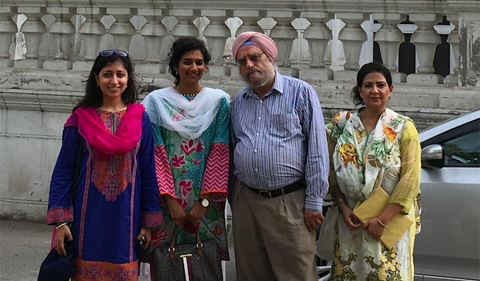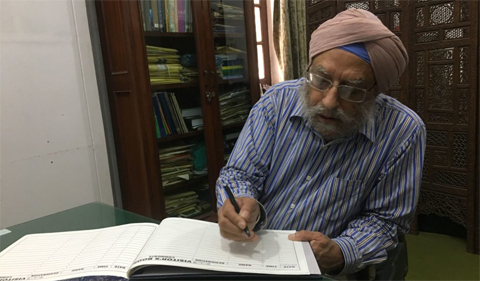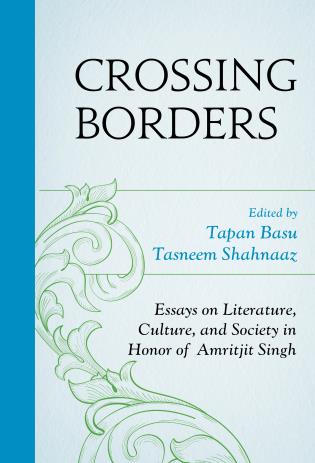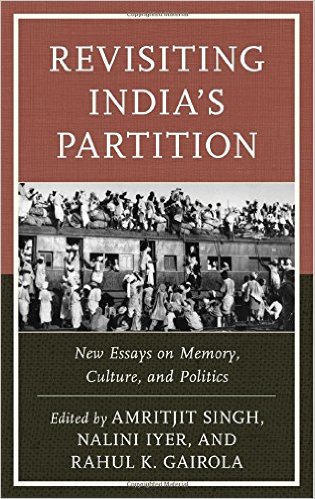
Dr. Amritjit Singh. Photo by Noopur Banerji
by Kristin Distel
Dr. Amritjit Singh, Langston Hughes Professor of English and African American Studies, has had a year full of rich and wide-ranging activity. His career and scholarship were recently celebrated in multiple venues—an international television interview, a volume of essays published in his honor, and a story in OHIO’s Perspectives magazine.
In October 2017, during a short academic visit to Pakistan, Singh was interviewed on the popular Pakistani television program “The Classics Show: Literary Conversations” to discuss his personal, familial, and academic history and his professional accomplishments.
‘Literary Conversations’
In the interview with host Shabnam Riaz, Singh discussed the breadth of his research and scholarly pursuits. Riaz questioned Singh about his work on the Harlem Renaissance, and he discussed the connections between the civil rights movement and the Harlem Renaissance. Specifically, he commented on the significance of the diction and images in Claude McKay’s sonnet “If We Must Die” and Langston Hughes’s “The Negro Speaks of Rivers.”
Singh also discussed the social impact and importance of literature as “an integrative force,” both within and outside the classroom, and a means of combating racist and classist oppression. “If I am a member of a marginalized group,” Singh says, “nobody can stop the possibility of my expressing my pain, my grief, my desires, and my wishes.”

Dr. Amritjit Singh was invited to tour the Quaid-e-Azam Library in Lahore.
Singh also commented on the importance of poetry, referencing the courses he teaches at OHIO and their frequently heavy emphasis on poetry.
“In my classes, I include a lot of poems,” Singh says. “I think if you want to learn how to read a wealth of literature, there is no better way to do that than to engage with a poem. … I am giving [my students] certain tools and processes that they can take to a work of fiction by Toni Morrison, by William Faulkner, or by Hemingway.”
Riaz’s questions about poetry and teaching led Singh to remark on what he himself takes away from the poems he discusses with his students. In speaking about Robert Frost’s poem “Mending Wall,” Singh connected the meaning of the poem to his personal teaching philosophy. “Frost wrote, ‘Spring is the mischief in me, and I wonder/ If I could put a notion in his head.’ I think my whole teaching is about putting a notion in the heads of my students,” Singh states.

Dr. Amritjit Singh was given a tour of the Quaid-e-Azam Library and its holdings and facilities.
Riaz also asked Singh to discuss his work as a translator, including The Circle of Illusion: Poems by Gurcharan Rampuri, a volume of 50 poems translated from Punjabi by Singh and colleague Judy Ray. Singh notes that these translations were completed over 10 years, with each poem taking weeks of collaborative work.
“This was all a labor of love,” he remarks.
Crossing Borders—A Metaphor for a Vibrant Career
Additionally, a collection of essays has been recently published in Singh’s honor. The book, titled Crossing Borders: Essays on Literature, Culture, and Society in Honor of Amritjit Singh, was edited by Tapan Basu and Tasneem Shahnaaz and published by Fairleigh Dickinson University Press. An Indian edition of the book was released at a two-day seminar in August 2017 at the University of Delhi, where the two editors teach and where Singh started on his teaching career in 1965.

‘Crossing Borders’ has recently been published in Singh’s honor
The concept of “crossing borders” indeed resonates in Singh’s life and scholarship, and serves as a fruitful metaphor for his work. Born in British India before the country was partitioned in 1947 into India and Pakistan, Singh has crossed physical and conceptual borders throughout his distinguished career. He has taught in three continents and lectured in dozens of countries in Asia, Europe, Africa, and North America.
Several of the book’s contributors spoke during a roundtable discussion in Boston in May 2017 at the American Literature Association conference, where they remarked both on their own work and on Singh’s generosity as a scholar and mentor.
Thadious Davis, Geraldine R. Segal Professor of American Social Thought and Professor of English at the University of Pennsylvania, noted, “In selecting a topic [for my chapter], I considered Professor Amritjit Singh’s groundbreaking 1976 book, The Novels of the Harlem Renaissance, because for a generation of scholars starting out in the 1970s, that work and a slim handful of other texts marked the dawning of the new age in African American studies of the Harlem or New Negro Renaissance.”
Martha J. Cutter, Professor of English and Africana studies at the University of Connecticut, contributed a chapter on Sui Sin Far to the Crossing Borders volume. In her remarks, she commented at length on the way Singh exemplifies the spirit of “crossing borders”:
This is something I think we all take from Amritjit—that borders are meant to be broken, that nothing can and should hold back our intellectual and professional inquiries. … I have noticed with Amrijit there never was any border—he never saw me as a junior scholar, as a woman, as an American—only as a person he might converse with, or even drag into his intellectual world and social circle forcefully.
Crossing borders is never easy, but Amritjit has always made it look so. He himself is a translated man, living in translation, and teaching us how to translate ourselves.
Contributor Fred Gardaphé, Distinguished Professor of English and Italian American Studies at Queens College, CUNY, concluded his ALA remarks by stating, “Thank you Amritjit, for your work, your leadership, and most of all for your friendship that all taught me that by studying others we can learn much about ourselves.”
Gardaphé apparently had in mind Professor Singh’s lifelong commitment to African American literary studies in his extensive work on authors such as Langston Hughes, Wallace Thurman, Richard Wright, Ralph Ellison, Ishmael Reed, and Charles Johnson.
Ayesha Hardison, Singh’s former English Department colleague at OHIO, also contributed a chapter to the volume. “Crossing Borders speaks to Amrit’s academic layers: the edited collection’s opening scholarly essays and closing personal reflections illustrate his influence in the fields of Postcolonial, South Asian, U.S. Ethnic, and African American literary studies,” Hardison notes. “Browsing the table of contents illustrates Amrit’s far-reaching, long-lasting imprint on the profession by outlining his sustained relationships in addition to his scholarly contributions.”
Partition—Interrogating an Insuperable Border
Singh’s scholarly and personal interest in border crossing is also apparent in the 2016 volume he co-edited, Revisiting India’s Partition: New Essays on Memory, Culture, and Politics. According to Singh and his co-editors, this unique interdisciplinary volume aims to “to shed new light on how British India’s 1947 partition and its sectarian consequences have had an enduring impact on the peoples of India, Pakistan, Bangladesh.”

Professor Singh’s co-edited volume
The continued prejudice, violence, and mistrust among groups of people displaced and affected by India’s partition are, in part, the impetus behind this book project, accomplished with zeal and careful attention by Singh and his two co-editors: Professor Nalini Iyer of Seattle University and Dr. Rahul K. Gairola of IIT-Roorkee, India.
Additional information about Singh’s scholarly work, including Revisiting India’s Partition, is available in the Spring/Summer 2017 issue of OHIO’s Perspectives magazine. Revisiting India’s Partition: New Essays on Memory, Culture, and Politics is available from Rowan and Littlefield Publishers. Crossing Borders: Essays on Literature, Culture, and Society in Honor of Amritjit Singh is available for purchase through Fairleigh Dickinson University Press.



















14 Comments